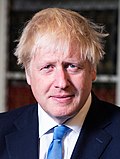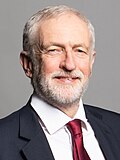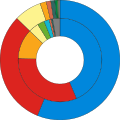2019 United Kingdom general election
A general election was held on 12 December 2019 to elect all 650 members to the House of Commons of the United Kingdom. The Conservative Party won with a landslide majority and Boris Johnson stayed as Prime Minister. The Labour Party lost 60 seats, giving them their lowest number of seats (202) since 1935.[2][3]
| |||||||||||||||||||||||||||||||||||||||||||||||||||||||||||||||||||||||
All 650 seats in the House of Commons 326[n 1] seats needed for a majority | |||||||||||||||||||||||||||||||||||||||||||||||||||||||||||||||||||||||
|---|---|---|---|---|---|---|---|---|---|---|---|---|---|---|---|---|---|---|---|---|---|---|---|---|---|---|---|---|---|---|---|---|---|---|---|---|---|---|---|---|---|---|---|---|---|---|---|---|---|---|---|---|---|---|---|---|---|---|---|---|---|---|---|---|---|---|---|---|---|---|---|
| Opinion polls | |||||||||||||||||||||||||||||||||||||||||||||||||||||||||||||||||||||||
| Turnout | 67.3% ( | ||||||||||||||||||||||||||||||||||||||||||||||||||||||||||||||||||||||
| |||||||||||||||||||||||||||||||||||||||||||||||||||||||||||||||||||||||
 A map presenting the results of the election, by party of the MP elected from each constituency. | |||||||||||||||||||||||||||||||||||||||||||||||||||||||||||||||||||||||
| |||||||||||||||||||||||||||||||||||||||||||||||||||||||||||||||||||||||
Labour leader Jeremy Corbyn quit after the loss saying he "would not lead Labour at the next election".[4] This led to a leadership election in the party where Keir Starmer became the new leader.[5]
34 MPs out of the 650 elected had quit or been disciplined by their party or by parliamentary colleagues over claims of bad behaviour by the end of 2023. This was more than any previous parliament.[6]
Summary
A summarised results of the parties that won seats at the election is as follows:
| Party | Leader | MPs | Votes | ||||
|---|---|---|---|---|---|---|---|
| Of total | Of total | ||||||
| Conservative Party | Boris Johnson | 365 | 56.2% | 365 / 650 |
13,966,565 | 43.6% | |
| Labour Party | Jeremy Corbyn | 202 | 31.1% | 202 / 650 |
10,269,076 | 32.2% | |
| Scottish National Party | Nicola Sturgeon | 48[n 4] | 7.4% | 48 / 650 |
1,242,380 | 3.9% | |
| Liberal Democrats | Jo Swinson | 11 | 1.7% | 11 / 650 |
3,696,423 | 11.6% | |
| Democratic Unionist Party | Arlene Foster | 8 | 1.2% | 8 / 650 |
244,128 | 0.8% | |
| Sinn Féin | Mary Lou McDonald | 7 | 1.1% | 7 / 650 |
181,853 | 0.6% | |
| Plaid Cymru | Adam Price | 4 | 0.6% | <div style="position: absolute; background-color:Lua error in package.lua at line 80: module 'Module:Political party/P' not found.;width:0px;height:1.5em;"> 4 / 650
|
153,265 | 0.5% | |
| Social Democratic and Labour Party | Colum Eastwood | 2 | 0.3% | <div style="position: absolute; background-color:Lua error in package.lua at line 80: module 'Module:Political party/G' not found.;width:0px;height:1.5em;"> 2 / 650
|
118,737 | 0.4% | |
| Green Party of England and Wales | Jonathan Bartley Siân Berry |
1 | 0.2% | <div style="position: absolute; background-color:Lua error in package.lua at line 80: module 'Module:Political party/G' not found.;width:0px;height:1.5em;"> 1 / 650
|
835,579 | 2.7% | |
| Alliance Party of Northern Ireland | Naomi Long | 1 | 0.2% | <div style="position: absolute; background-color:Lua error in package.lua at line 80: module 'Module:Political party/G' not found.;width:0px;height:1.5em;"> 1 / 650
|
134,115 | 0.4% | |
| Speaker | Lindsay Hoyle | 1 | 0.2% | 1 / 650 |
26,831 | 0.1% | |
2019 United Kingdom General Election Media
Notes
- ↑ Given that Sinn Féin MPs do not take their seats and the Speaker and deputies do not vote, the number of MPs needed for a majority is, in practice, slightly lower. Sinn Féin won 7 seats, meaning a practical majority requires at least 320 MPs.
- ↑ Figure does not include the Speaker of the House of Commons Sir Lindsay Hoyle, who was included in the Labour seat total by some media outlets. By longstanding convention the Speaker severs all ties to their affiliated party upon being elected as Speaker.
- ↑ Nicola Sturgeon sits as an MSP in the Scottish Parliament for Glasgow Southside. Ian Blackford, MP for Ross, Skye and Lochaber, is the SNP leader at Westminster.
- ↑ 4.0 4.1 Includes Neale Hanvey, who was suspended from the party at the time of his election and thus took his seat as an independent.
References
- ↑ "Results of the 2019 General Election". BBC News. Retrieved 14 December 2019.
- ↑ "Results". BBC News. Retrieved 13 December 2019.
- ↑ "Share of votes in general elections in the United Kingdom from 1918 to 2017, by political party". Statista. Retrieved 13 December 2019.
- ↑ Jeremy Corbyn: 'I will not lead Labour at next election'. BBC News. 13 December 2019. https://www.bbc.co.uk/news/election-2019-50766114. Retrieved 13 December 2019.
- ↑ Lynch, David (4 April 2020). "Labour leadership: Keir Starmer will lead the party after Jeremy Corbyn's exit". Oxford Mail (Newsquest Media Group). https://www.oxfordmail.co.uk/news/18358449.labour-leadership-keir-starmer-will-lead-jeremy-corbyns-exit/. Retrieved 4 April 2020.
- ↑ "Scale of misconduct by MPs 'undermines trust' in Westminster". www.ft.com. Retrieved 2023-12-18.












